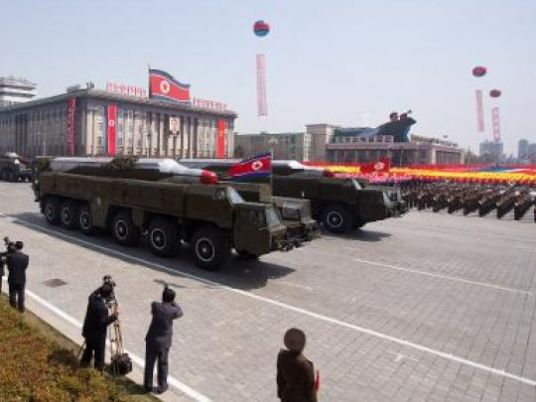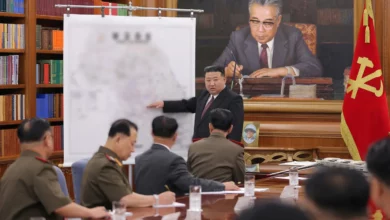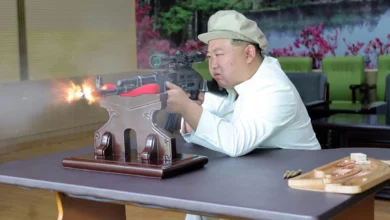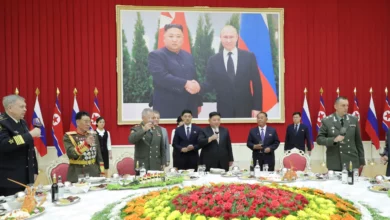
North Korea faces harsh new UN sanctions to starve it of money for its nuclear weapons program following a unanimous Security Council vote on Wednesday on a resolution drafted by the United States and Pyongyang's ally China.
The resolution, which dramatically expands existing sanctions, follows North Korea's latest nuclear test on Jan. 6 and a Feb. 7 rocket launch that Washington and its allies said used banned ballistic missile technology. Pyongyang said it was a peaceful satellite launch.
US Ambassador Samantha Power said the sanctions go further than any UN sanctions regime in two decades and aim to cut off funds for North Korea's nuclear and other banned weapons programs.
Two council diplomats said on condition of anonymity that the new resolution makes the North Korean sanctions regime even tougher than the Iran sanctions regime that they say led to a decision on Tehran's part to agree to an historic nuclear deal last year that led to most restrictions being lifted in January.
All cargo going to and from North Korea must now be inspected and North Korean trade representatives in Syria, Iran and Vietnam are among 16 individuals added to a UN blacklist, along with 12 North Korean entities.
Previously states only had to inspect such shipments if they had reasonable grounds to believe they contained illicit goods.
"Virtually all of the DPRK's (North Korea) resources are channeled into its reckless and relentless pursuit of weapons of mass destruction," Power told the council after the vote, adding that the cargo inspection provisions are "hugely significant."
She said the point of the resolution was to target the country's leadership, not its impoverished people, adding that North Korea is "a master of evasion" and would continue to try to evade the sanctions although the new measures would make that harder.
There was no immediate reaction from the North Korean UN mission. The official North Korean news agency KCNA said on Monday the proposed sanctions were "a wanton infringement on (North Korea's) sovereignty and grave challenge to it."
The White House said it was not clear how Pyongyang would react. The European Union foreign policy chief Federica Mogherini welcomed the UN vote, saying the European Union would update the bloc's sanctions regime to include the new measures. Diplomats said that could be done as soon as Friday.
UN Secretary-General Ban Ki-moon welcomed the 15-nation council's move, saying in a statement that Pyongyang "must return to full compliance with its international obligations."
North Korea has been under UN sanctions since 2006 because of its four nuclear tests and multiple rocket launches.
After nearly two months of bilateral negotiations that at one point involved US President Barack Obama and his Chinese counterpart, Xi Jinping, China agreed to support the unusually tough measures intended to persuade its close ally to abandon its atomic weapons program.
China's Ambassador Liu Jieyi called for a return to dialogue, saying: "Today's adoption should be a new starting point and a paving stone for political settlement of the nuclear issue on the Korean Peninsula."
However, he reiterated Beijing's concerns about the possible deployment of an advanced US missile system in South Korea.
"At this moment all parties concerned should avoid actions that will further aggravate tension on the ground," he said. "China opposes the deployment of the THAAD anti-missile system … because such an action harms the strategic and security interests of China and other countries of the region."
He was referring to the US Terminal High Altitude Area Defense (THAAD) system.
Shortly after the UN move, the US Treasury Department said it was blacklisting two entities and 10 individuals for ties to North Korea's government and its banned weapons programs, and said the State Department was also blacklisting three entities and two individuals for similar reasons.
The new UN sanctions close a gap in the UN arms embargo on Pyongyang by banning all weapons imports and exports.
The Security Council's list of explicitly banned luxury goods has been expanded to include luxury watches, aquatic recreational vehicles, snowmobiles worth more than $2,000, lead crystal items and recreational sports equipment.
There is also an unprecedented ban on the transfer to North Korea of any item that could directly contribute to the operational capabilities of its armed forces, such as trucks that could be modified for military purposes.
The new UN measures also blacklist 31 ships owned by North Korean shipping firm Ocean Maritime Management Company (OMM).
Added to the UN sanctions list was the National Aerospace Development Agency, or NADA, the body responsible for February's rocket launch.
Newly blacklisted individuals include a senior official in North Korea's long-range missile program, senior officials at NADA, officials for Tanchon Commercial Bank in Syria and Vietnam, and Korea Mining Development Trading Corporation (KOMID) representatives in Iran and Syria.
An earlier draft would have blacklisted 17 individuals but the proposed designation of a KOMID representative in Russia was dropped from the final version of the resolution.




